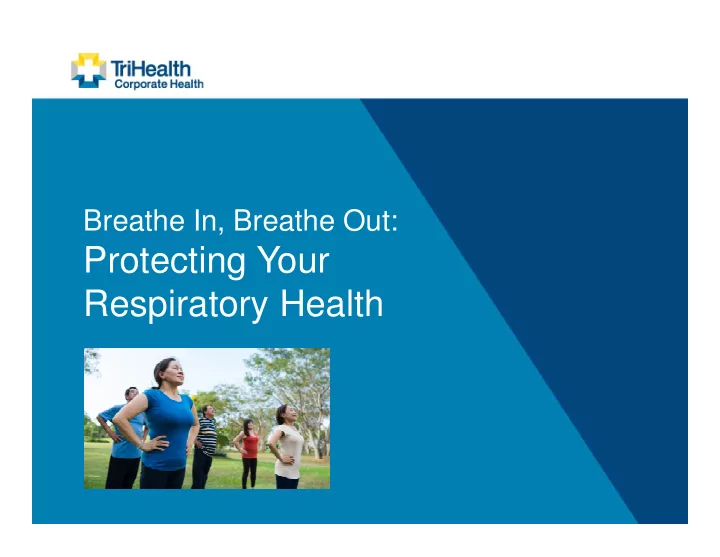

Breathe In, Breathe Out: Protecting Your Respiratory Health
Protecting Your Respiratory Health Tips to Help You Breathe Easier The American Lung Association suggests taking these steps to help keep your lungs healthy and reduce the risk of lung disease: Don’t Smoke: Cigarette smoking is the leading cause of lung cancer and • pulmonary diseases. Avoid Exposure to Pollutants: Second-hand smoke, air pollutions and chemicals can cause or • worsen lung disease. Prevent Infection: Wash hands often, avoid crowds during cold and flu season, get your flu vaccine • yearly, and practice good oral hygiene. Get a Check-Up: Regular check-ups help prevent diseases, including lung diseases, which often go • undetected until they become more severe. Exercise: Aerobic exercise helps improve lung capacity and specific breathing exercises, such as those • described in the above article, can be great for helping you to relax.
Protecting Your Respiratory Health Need to Reduce Stress? Take a Breath! When you breathe deeply, you send calming signals to your brain, which in turn sends soothing messages throughout your body. Try these two breathing exercises to help manage your stress: Be in a comfortable position in an easy chair or lying down. Close your eyes 1. and inhale deeply through your nose. Allow your lungs and abdomen to rise. Slowly exhale through your mouth. Do this for several repetitions. Again, begin in a comfortable position. Breathe in through your nose and 2. count to 7. Hold your breath and count to 7 and exhale through your mouth and count to 7. Do this for several repetitions. If counting to 7 is too long – shorten it to whatever feels comfortable.
Protecting Your Respiratory Health Exercising? Don’t Forget to Breathe The way we breathe during exercise has an influence on the efficiency and effectiveness of our workouts as well as our endurance. Here are a few tips to consider during your next workout: 1. Never hold your breath! This can result in poor posture and inefficient movements. 2. When lifting weights, always exhale as you move or push the weight. Inhale as you slowly return to the starting position. 3. When running, make certain your breaths aren't too quick and shallow. You won't take in sufficient oxygen for it to be delivered throughout the body if you breathe this way. Sometimes, it helps to breathe in for a count of three and breathe out for a count of two (or whatever feels most comfortable or beneficial for you.) 4. For quick bursts of activity, it is more natural to have quicker and shorter breathing patterns. In this case, this breathing pattern would be ok because you will have more time between movements to recover.
Protecting Your Respiratory Health Respiratory Health & Safety at Work According to Occupational Safety and Health (OSHA) statistics, • respiratory protection was among the top 10 most frequently cited OSHA standards violated in 2016. Proper respirator equipment protects workers against dangerous contaminants such • as harmful dusts, fogs, smoke, mists, gases, vapors and sprays. When exposed to respiratory hazards, employees are at increased risk for cancer, • lung impairment, or even death. Employers can help protect their workforce by implementing a respiratory protection • program that includes a written plan with worksite-specific procedures. Reference Source: OSHA.gov
Protecting Your Respiratory Health Chronic Obstructive Pulmonary Disorder (COPD) COPD is a chronic lung disorder resulting in blocked air flow in the lungs, and is the • fourth leading cause of death in the United States. Smoking is the leading cause of COPD deaths, accounting for approximately 90%. • Other causes of COPD include . . . • � Long-term exposure to second-hand smoke � Air pollution � Repeated respiratory infections Protect yourself from COPD by avoiding tobacco products and reducing exposure to • environments where second-hand smoke, fumes, and strong odors are present. Maintaining a healthy, active lifestyle also reduces the risk of developing COPD.
Recommend
More recommend